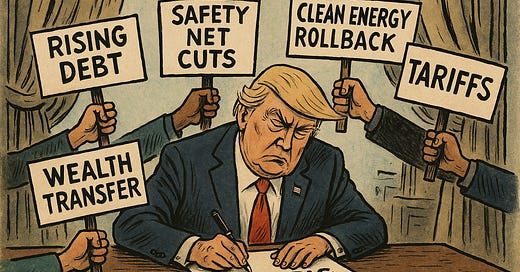One Big Beautiful Boondoggle
A Love Letter to the Bill Nobody Asked for by a Satirical Patriot with a Calculator and a Migraine
Introduction: Debt, Doughnuts, and Democracy
On July 4th, while the nation was busy grilling hot dogs and dodging relatives’ conspiracy theories, the President of the United States signed into law what he boldly called the “One Big Beautiful Bill” — or as some have dubbed it, “The Cheesecake Factory Menu of Legislation.” It’s got something for everyone: tax cuts, spending cuts, climate cuts, logic cuts, and maybe even paper cuts. In this essay, we’ll celebrate—yes, celebrate—the wisdom of the bill’s critics, who dared to read the fine print while everyone else was distracted by fireworks and whatever Florida was doing that day.
Part I: Fiscal Responsibility—A Party Where the Tab Is Yours
Let’s start with the math. The bill is expected to add up to $3.3 trillion to the national deficit over the next decade. That’s right—trillion, with a “T,” as in “Totally ignoring basic economics.” Critics argue that this is like maxing out your credit card and then giving yourself a raise for being such a savvy spender. We, the opposition, applaud this insight! While the bill’s supporters bragged about “unleashing the economy,” opponents noticed it also unleashed the debt Kraken. If debt were calories, this bill is a triple-stacked bacon cheeseburger with a side of sugar-glazed tax incentives.
Part II: The Great American Wealth Transfer—Robin Hood, but Backwards
Perhaps the bill’s most heartwarming feature is its commitment to helping struggling billionaires. Opponents noticed that 80% of American households will actually lose benefits when you factor in tariffs and cuts to public services. But the top 10%? Champagne showers, baby! It’s economic trickle-down—without the trickle. The opposition lovingly called this the “Reverse Oprah Effect”: You get less! You get less! Everybody gets less! Except, of course, the hedge fund managers, who get a new boat.
Part III: Clean Energy Gets... Cleaned Out
The bill also courageously slashes climate spending, because who needs breathable air when you’ve got freedom? It repeals most of the Inflation Reduction Act’s incentives for clean energy and instead offers subsidies to fossil fuel companies that already make more money than most small countries. The critics, ever alert, pointed out that this would set us back decades in the global energy race. But hey—coal is the new kale, right?
Part IV: Safety Net? More Like Safety Napkin.
The bill’s cuts to Medicaid and SNAP are so bold, one might mistake them for an episode of Survivor: Washington D.C. Critics noted that 10 to 12 million people could lose access to health care. “Let them eat tax breaks,” said no one out loud, but the bill’s authors seemed to think it. Some experts warn of tens of thousands of avoidable deaths. But the good news? Fewer people means fewer complaints! Win-win.
Part V: ICE, ICE, Baby—But Make It Terrifying
Under this bill, ICE becomes the best-funded domestic agency in history. The opposition affectionately labeled this the “Department of Keeping You Up at Night,” noting that the budget expansion could rival NASA’s, but instead of exploring Mars, it’s exploring your aunt’s immigration papers. Critics argue that this could lead to civil rights violations, but supporters say it's about order, security, and keeping Tucker Carlson employed.
Part VI: Why the President Thinks It’s So Great
Let’s be fair. From the President’s point of view, this bill is a masterpiece. It’s bold. It’s branded. It’s got “beautiful” in the name. What more could you want? According to the White House, the bill jumpstarts the economy, reins in waste (except for all that new spending), and makes America competitive again (in the 1950s). Plus, he got to sign it at a July 4th barbecue, which he said was “the most patriotic event since the invention of corn dogs.”1
And as for the bipartisan backlash, hey, everybody’s talking about it. Even the people who hate it. That means it’s a hit. After all, nothing brings Americans together like a little economic panic.
Conclusion: One Big Beautiful Disaster—And That’s Why We Oppose It
The critics aren’t joyless naysayers—they’re just folks who don’t like detonating the social contract with a sparkler. They’ve read the footnotes. They’ve done the math. They’re the designated drivers in a country doing donuts in the economic parking lot. And while they may not have the floor of Congress, they do have common sense, basic empathy, and, occasionally, a calculator.
So here’s to the opposition—may your warnings be heeded, your memes be viral, and your taxes somehow deductible.
He didn't actually say that. Just having some fun, that's all…🙃







